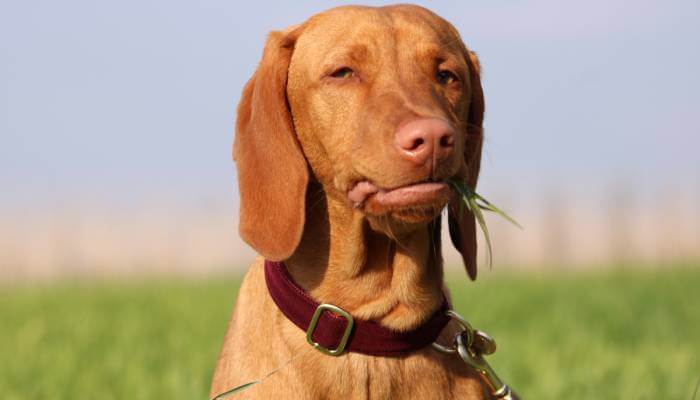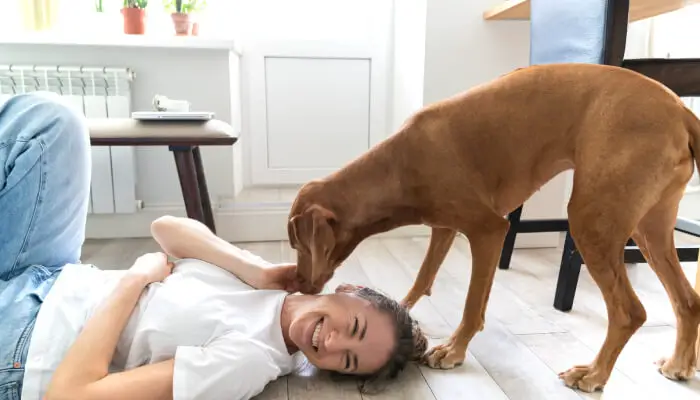Have you noticed that your Vizsla dog is not going to the bathroom as much as usual? Constipation in Vizslas can occur due to various factors, and if left untreated, it can lead to serious health problems. Constipation can also cause the dog’s stool to become complex and challenging for them to pass. In this blog post, we will go over constipation in Vizsla and how you should treat it.
It is common if your Vizsla does not have a bowel movement for a day or two. Constipation can also happen if your dog eats a large meal and does not have enough time to digest it. Constipation in Vizslas is common for puppies, which frequently will only eat small amounts of food at one sitting.
It would help if you did not ignore constipation in Vizsla. It can lead to further complications and symptoms like backache, pain while walking or running, loss of appetite, lethargy, vomiting, or diarrhea. Constipation also causes intestinal impaction, which will require surgery to remove the solid mass from obstructing their intestines.
Symptoms Of Constipation In Vizsla Dogs
The most noticeable symptom that you may see in your dog with constipation is the absence of bowel movements and straining to defecate. Or if they are not going to the bathroom for a couple of days.
Constipation can also cause your dog’s stool to become complex and challenging for them to pass. Constipation in Vizslas can also lead to a decrease in appetite, lethargy, or vomiting.
Additional signs you may see with constipation in dogs are as follows:
- Lack of defecation for a few days
- Dry/hard stool,
- Loss of appetite,
- Vomiting,
- Dyschezia,
- Stools are challenging to pass,
- Painful/difficult breathing,
- Lethargy.
Causes of Constipation in Vizsla
Constipation occurs due to many different factors such as overeating food at one time, not enough water intake, changes in diet or exercise routine (such as neutering), chronic health issues, or anything that may affect the nervous system. It may also result from an obstruction in the intestine which prevents bowel movements from coming out of your dog’s rectum. Finally, it can happen if your Vizsla happened to swallow mud/dirt, rocks/pebbles, garbage, even their fur from excessive self-grooming.
Some dog breeds, Vizsla Dogs included, are more prone to Constipations than others due to their specific anatomy (e.g., elongated colon).
You should contact your veterinarian if they have not gone to the bathroom within the last 48 hours.
Veterinarians diagnose constipation in Vizslas by performing a physical exam and taking the dog’s blood pressure, and doing x-rays of their abdomen to see if they have an obstruction or any other health problems that may be causing it.
Other causes of constipation in Vizsla:
Age
Age also plays a factor in constipation. Constipation is common for puppies, as they tend to eat small amounts of food at one sitting, and their intestinal tracts are still developing.
Dehydration or electrolyte imbalances
A lack of water intake can also cause constipation in Vizslas. The opposite: too much water that overwhelms the system will lead to constipation in dogs with sensitive stomachs or difficulty with regular bowel movements.
Improper Diet
Not enough fiber in their diet is another cause of constipation in Vizsla dogs. Fiber promotes the production of stool, which is necessary to induce defecation and bowel movement. Therefore, the food you feed your Vizslas plays a crucial role in their health.
Higher fats, proteins, and carbohydrates are present in processed foods. Continuous intake of such foods can be harmful to your pet because they are difficult to digest. As a result, your Vizslas might suffer from constipation. But adding more fibers and lesser carbohydrates can assist in proper digestion and a healthy digestive system.
So, it is up to you want you to include in the diet of your Vizsla matters a lot.
Lack Of Exercise
Constipation can also result from lack of exercise, which causes muscles to tighten and not allow for stool to pass through easily. Vizslas are an energetic dog breed that needs regular exercise for the proper functioning of their body.
Worm Infestation
Worm infestation can lead to constipation in Vizsla dogs. Worms cause a bowel obstruction, which prevents them from moving through the intestines and out of the rectum. Constipation is a symptom that your dog has worms, but it is not always the cause for constipation.
Matted Hair Blocking The Anus
If your dog has an excess of matted hair around the anal area, it can lead to constipation in Vizsla dogs. Matted hair fur blocks the anus and prevents bowel movements. Constipation caused by matted hair shows symptoms like vomiting, diarrhea, or difficulty in breathing.
Enlarged Prostate
Enlarged prostate is another common cause of constipation in Vizslas. An enlarged prostate does not allow for an easy bowel movement to pass through the anus, which may lead to constipation and straining during defecation.
Tumors
Tumors in the colon or anus can also lead to constipation in dogs. In addition, this condition can cause bleeding stricture, making it difficult for stool to pass through due to blood flow restriction and intestinal spasms.
Hernia
In constipation in Vizsla dogs, the hernia can cause the intestine to bulge out through the anus. A hernia can fall back inside your dog’s body and obstruct bowel movement, leading to constipation.
Kidney Disease
Kidney disease can lead to constipation in dogs. Kidneys are responsible for keeping water levels balanced, which is essential for effective bowel movements. When kidneys fail, it accumulates waste products and fluid retention that prevents the dog from defecating normally.
Hyperthyroidism
Hyperthyroidism in dogs can lead to constipation. It causes an overabundance of hormones that cause the dog’s body systems to run extremely fast, which interferes with bowel movements and leads to constipation.
Diabetes Mellitus
Another common reason for constipation in Vizslas is diabetes mellitus. Constipation and frequent urination are two symptoms of diabetes mellitus that may be difficult to recognize. Constipation can also cause a dog with diabetes mellitus to exhibit lethargy, vomiting, and weight loss.
Medication To Treat Another Condition
Some medication has constipation as a side effect. So, constipation in dogs may occur when a dog is taking medication for another condition. For example, antibiotics can cause constipation due to the damage it causes to beneficial bacteria that aid with proper digestion and bowel movements. Other medications such as antacids containing aluminum hydroxide or calcium carbonate also lead to constipation in dogs.
Treatment For Constipation in Vizsla Dogs
The treatment for constipation will depend on what caused the problem, but it usually involves getting the dog to drink more water and feed them a high-fiber diet. You can treat constipation in Vizsla through laxatives or enemas if necessary.
Home remedies that might help your Vizsla get things moving again:
Hydration
You can also treat constipation by providing your dog with more water. Start slow and gradually increase the amount of fluid Vizsla drinks over 12 hours until you are up to 100% of their average intake, which is about 20-30 ounces per day for an average size Vizsla.
Feed-In Portion
If your dog is suffering from constipation due to overeating food, you should feed him smaller portions more often and make sure he has enough water.
If you are not sure how much to feed your Vizsla, divide the food by four and then give them that many meals per day. Over-eating or eating too fast can also cause constipation.
Fiber & Probiotics
Constipated dogs should be fed high-fiber foods such as pumpkin or bran biscuits, raw fruits/veggies like applesauce, carrots (cooked), spinach (raw), etc. These items must have sufficient amounts of pulp, so your dog can get some help passing their stool quicker than if consuming plain vegetables alone without any additional fiber.
Feeding your dog a high-fiber diet with probiotic supplements will help in Constipation treatment as well. You should introduce fiber gradually into their system to avoid the risk of diarrhea, which comes with constipation in dogs.
Exercise Your Vizslas More Often
As mentioned earlier, exercise causes muscles to relax, and stool comes out more quickly; it also applies to constipation. Exercise also helps promote healthy bowel movements because it stimulates blood flow.
Getting outside for walks will help stimulate your dog’s intestinal tract and help them “go.”
Extra supplements
Your veterinarian might prescribe some extra dietary fiber to help Constipation in Vizslas. You can give it through the mouth or the rectum as a suppository (if they are unable). Ensure your pet is eating high-fiber foods before supplementing with extra fiber, as it will not work otherwise.
Canned Dog Food
Constipation can also result from eating too many dry dog foods, which are low in fiber. Constipated dogs should eat canned dog food instead to help promote the production of intestinal movement. Feeding them canned Dog Food can help to provide additional water and fiber with the food.
You can usually treat constipation by providing your Vizsla with more water and high-fiber foods that will stimulate bowel movements or as needed with laxatives.”
Change Their Diet
Some of the times, diet might be a result that causes constipation in Vizslas. Too much unhealthy protein and fat can cause indigestion along with inflammation of digestive organs. So, a change of diet can benefit in such cases.
Further, the use of more fibers and water in the diet, giving more influence in natural foods, maintaining a clean and hygienic diet, etc., can help reduce the chances of constipation in the future.
Additional Tips:
Ask your vet about dietary changes that may benefit when Constipations in Vizsla Dogs occur frequently or chronically.
You can alleviate constipation in the long term with these simple steps: increase intake of high-quality protein, reduce consumption of grains/starches and introduce more vegetables into the diet (especially broccoli). It would help if you made sure there are no underlying health conditions and constipation results from other illnesses.
Besides this, it is very vital to take proper care of your Vizsla. These dogs are usually very active and more likely to run around and eat everything adjacent to them. So, it would help if you kept them under regular supervision until they grow big enough to know what is good for them.
When To See A Doctor / Tale Your Constipated Vizsla To The Vet?
Constipation that lasts longer than three days is a serious medical condition that needs professional treatment. Constipated dogs may also have swollen or bloated abdomen, lethargy, dehydration, and poor appetite, which are all symptoms of an underlying health condition like parasites, intestinal obstruction or cancer.”
If constipation persists or becomes chronic, Constipation in Vizsla Dogs may be a sign of an underlying health condition. Seek veterinary help for your dog as soon as possible.
What Will A Veterinarian Do To A Constipated Vizsla?
In typical cases, a vet will perform a physical exam to look for abnormalities that might cause constipation. The vet will also perform a blood test and urinalysis to check for signs of other diseases or infections. Then, depending on the severity of the underlying cause, your veterinarian may prescribe a laxative to Constipation in Vizslas.
In more extreme cases, veterinarians will recommend surgery for Constipation in Vizslas.
Conclusion
Constipation, or difficulty passing stools on a regular schedule, can be very uncomfortable for your dog. It is especially the case if constipation persists longer than three days and no other symptoms present like fever. Consult with your veterinarian to find out what may cause Constipation in Vizslas Dogs.



